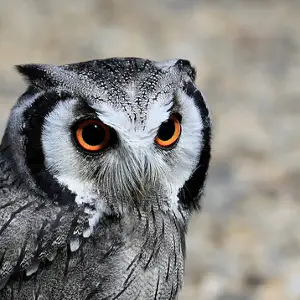Together with the healer, the cursed person needs to make a rice wine and get drunk. The healer will then call the tikwara’s owner and kindly ask for forgiveness. If the bird’s owner decides to forgive the person, the transgressor will be healed; if not, he will continuously suffer and die.
What is the Belief about the Palawan Scops-owl (Otus fuliginosus)?

The Pala’wan’s belief about the owl is almost the same with the former one. However, the tribe dreads this creature more than the night heron.
Once the natives hear the owl’s call, they are so afraid because they think that it’s very near them and that they need to be careful; they’d better hide. They believe that this bird is possessed by evil spirits. It turns into a ferocious creature or a beast that eats human beings.
Environmental Perspective
The belief that supernatural beings own the tikwara and gukgok, defined how the Pala’wans should treat these birds. They continuously avoid close contact with the birds thinking that they might displease the evil spirits or the unseen creatures who own them. This belief helped conserve the birds within the remote areas of Quezon and Rizal as the birds are regarded with fear and respect. Killing or harming the birds is prohibited for fear of retribution.
I can still see and hear these birds in Quezon or Rizal, even in the urban City of Puerto Princesa, as I treasure to see these avian species. In fact, I am currently a member of the Birdwatch Palawan Ornithological Society, an organization that popularizes bird watching as a hobby and promote birding as a tool for species conservation.
Thanks to the belief of my forefathers for it helped sustain the population of these species, especially the scops-owls that are usually seen in forested areas where the Pala’wans live. Moreover, based on the International Union for Conservation of Nature and Natural Resources’ (IUCN) (2014) classification, the status of Palawan Scops-owl is already near threatened which means it is considered threatened with extinction in the near future. The Rufous Night-heron, however, fares better as it is classified under species of least concern. Knowing this, it is very important that people pay close attention to the conservation and sustainability of these species, including other creatures in the wild as well.
The strict implementation of policies should be carried out by the concerned authorities. In support to their initiatives, The participation of local communities towards species conservation should also be encouraged.
Let us not touch nor catch the birds; instead, we just have to look and watch!
References:
Docto, R.M. (2008) Sustainable agriculture and Pala’wans farming practices. Palawan State University Journal. Puerto Princesa City, Palawan. 8p.
IUCN (2014). International Union for Conservation of Nature and Natural Resources. Available: http://www.iucnredlist.org/.
Roa, A. T. (2014). Personal interview – Beliefs of the Pala’wan tribe. Puerto Princesa City.
Tauli-Corpuz, V., and R. De Chavez (2010). Indigenous peoples, forests & REDD plus: sustaining & enhancing forests through traditional resource management. Tebtebba Foundation, Valley Printing Specialist, Baguio City, Philippines.
© 2014 September 24 S. A. Roa



